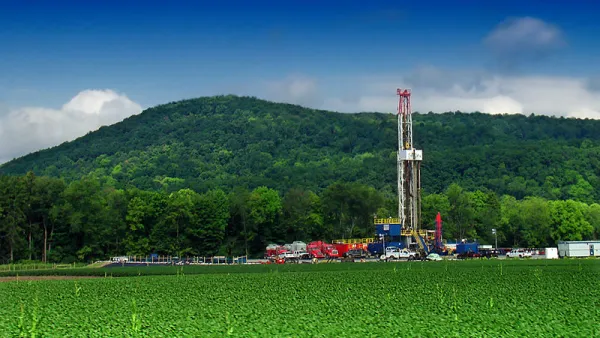On the heels of President Obama's Clean Power Plan rule that reduces carbon dioxide emissions from power plants, the new rule focuses on the other major greenhouse gas, methane, and rather than coal, it is focused on oil and gas drilling.
"The Environment Protection Agency is proposing a new rule that would reduce methane emissions from oil and natural-gas drilling by 40 to 45 percent of 2012 levels by 2025," writes Krishnadev Calamur, a senior editor at The Atlantic. "The rules, which would apply only to new and modified gas wells, were first outlined in January by the White House" (and posted here).
EPA's final Clean Power Plan rule, released earlier this month, addressed carbon dioxide emissions from power plants, particularly those that burned coal.
"Both (carbon dioxide and methane) contribute to global warming, but methane’s global-warming potential (the amount of heat trapped by a specific amount of mass) is more than 25 times greater than that of CO2, the EPA says," writes Calamur. "The oil and gas industry was responsible for about 30 percent of methane emissions in the U.S. in 2012.
The energy industry opposes the regulations. In fact, the oil industry seems the rule as part of the administration's "war on oil," notwithstanding President Obama's go-ahead on August 18 to Shell to begin drilling in the Arctic Ocean
In addition to methane, the new rules will reduce volatile organic compound (VOC) emissions, a major component of smog, from the new wells according to EPA's press release. While methane is a major component of natural gas, the rule will affect oil drilling, particularly where fracking is involved as the press release indicates:
EPA’s proposal would also require that industry reduce VOC and methane emissions from hydraulically fractured and refractured oil wells, which can contain significant amounts of natural gas along with oil
"In a conference call with reporters, Janet McCabe, the Environmental Protection Agency’s acting assistant administrator for the Office of Air and Radiation, said the rules were designed to ensure that oil and gas companies reduced waste and sold more gas that would otherwise be lost, while protecting the climate and the health of the public," write Gardiner Harris and Coral Davenport for The New York Times.
Continued reliance on dirty fossil fuels is a dangerous course for our communities and our climate. We must move swiftly to truly clean energy like wind, solar and energy efficiency while establishing policies that keep fossil fuels in the ground."
FULL STORY: The EPA's New Methane Rules for the Oil and Gas Industry

National Parks Layoffs Will Cause Communities to Lose Billions
Thousands of essential park workers were laid off this week, just before the busy spring break season.

Retro-silient?: America’s First “Eco-burb,” The Woodlands Turns 50
A master-planned community north of Houston offers lessons on green infrastructure and resilient design, but falls short of its founder’s lofty affordability and walkability goals.

Delivering for America Plan Will Downgrade Mail Service in at Least 49.5 Percent of Zip Codes
Republican and Democrat lawmakers criticize the plan for its disproportionate negative impact on rural communities.

Test News Post 1
This is a summary

Test News Headline 46
Test for the image on the front page.

Balancing Bombs and Butterflies: How the National Guard Protects a Rare Species
The National Guard at Fort Indiantown Gap uses GIS technology and land management strategies to balance military training with conservation efforts, ensuring the survival of the rare eastern regal fritillary butterfly.
Urban Design for Planners 1: Software Tools
This six-course series explores essential urban design concepts using open source software and equips planners with the tools they need to participate fully in the urban design process.
Planning for Universal Design
Learn the tools for implementing Universal Design in planning regulations.
EMC Planning Group, Inc.
Planetizen
Planetizen
Mpact (formerly Rail~Volution)
Great Falls Development Authority, Inc.
HUDs Office of Policy Development and Research
NYU Wagner Graduate School of Public Service



























